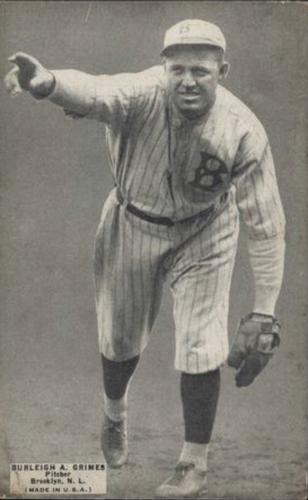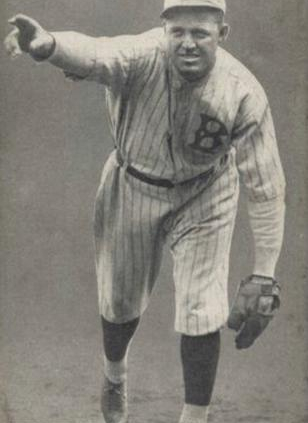October 6, 1920: Burleigh Grimes throws World Series shutout for Brooklyn
 Fans in Brooklyn lined up outside Ebbets Field for tickets to the World Series on Monday, October 4, 1920. For $1 or $2 they could get a ticket to see their hometown heroes the Dodgers, Brooklyns, Superbas, or Robins play in the World Series against the Cleveland Indians. It didn’t matter which nickname a fan chose for the team because, more important, these devoted followers “pay the bills, do the shouting, bait the umpire and keep the National Pastime on its feet,” wrote the Brooklyn Daily Eagle.
Fans in Brooklyn lined up outside Ebbets Field for tickets to the World Series on Monday, October 4, 1920. For $1 or $2 they could get a ticket to see their hometown heroes the Dodgers, Brooklyns, Superbas, or Robins play in the World Series against the Cleveland Indians. It didn’t matter which nickname a fan chose for the team because, more important, these devoted followers “pay the bills, do the shouting, bait the umpire and keep the National Pastime on its feet,” wrote the Brooklyn Daily Eagle.
Keeping the game on its feet was maybe the most important contribution the fans made at that time. Baseball had been rocked by scandal and the World Series of 1919 would be forever remembered for gamblers and crooked play, which left a stain on the game. How would fans react, since a grand jury was currently exploring this Black Sox scandal? In Brooklyn, the line of fans waiting for tickets was never less than 500 during the day. Some fans made an entire day out of it anyway, “hanging about in the neighborhood, patronizing transient hot doggeries and this and that to while away the time.”1 They were ready.
A 20-5 September helped propel Wilbert Robinson’s Brooklyn club to the National League pennant. Pitching was the main reason the team was in the World Series. Brooklyn’s pitching staff had the best ERA (2.62) and the most strikeouts (553) in the NL. Burleigh Grimes led the way with a 2.22 ERA and a 23-11 record. But their hitting wasn’t bad, either, led by Zack Wheat, Hi Myers, and Ed Konetchy, all .300 hitters.
While fans in Brooklyn stood in line during the day, the Cleveland Indians hopped the train that night heading east. “We can hit them all,” one player optimistically remarked about the Brooklyn pitching.2 The Indians had survived a tight pennant race all season, and their 20-6 mark in September helped them outlast the emerging Yankee dynasty and the scarred White Sox franchise. Six Cleveland starters batted over .300, giving the team a .303 average. Three starting pitchers won a total of 75 games: Jim Bagby (31 wins), Stan Coveleski (24), and Ray Caldwell (20).
Game One at Ebbets Field drew 23,573 fans who were disappointed when their home team couldn’t muster any offense against Coveleski. Brooklyn starter Rube Marquard was knocked for three runs in a 3-1 loss. Game Two was Grimes vs. Bagby before a smaller crowd of 22,559. A highly experienced crew of umpires handled the Series: Tommy Connolly, Hank O’Day, Bill Dinneen, and Bill Klem.
After a scoreless top of the first, Brooklyn put a run on the board in the bottom of the inning. With one out, Jimmy Johnston bounced a grounder to deep shortstop. Joe Sewell stopped it on the grass but his throw was low and hit the bag, bouncing straight up in the air. Johnston was safe. Johnston stole second and, after a groundout, scored on a hit by Wheat, who stretched it into a double with some fine sliding around Sewell. “Sewell’s lack of experience was responsible for his failure to make the out,” wrote Thomas S. Rice in the Brooklyn Daily Eagle.3 “Little Joe did not shine with any undue amount of brilliance today,” remarked Henry P. Edwards in the Cleveland Plain Dealer.4
Many at Ebbets Field were probably thinking the same thing: Ray Chapman would never have let that happen. Chapman, the Indians’ young shortstop, had been hit in the head by a pitch from the Yankees’ Carl Mays on August 16. The blow to the left side of his skull resulted in emergency surgery, but Chapman died the next day. The Indians were playing the Series in his memory.
Grimes put a man on base in each inning from the second through the fourth. In the second, it was Larry Gardner, who pulled a double down the left-field line. Gardner was caught in no man’s land on Doc Johnston‘s bouncer to the mound and was tagged out. In the third, after two were out on comebackers to the box, Charlie Jamieson singled to center. In the fourth, player-manager Tris Speaker drew a walk. Both Jamieson and Speaker were left on base.
In the bottom of the third, Grimes helped his own cause by hitting a single to center. Ivy Olson laid down a bunt and on Bagby’s wild throw to second, both runners were safe. Grimes was spiked by Sewell on the play as he leapt over Sewell and went headfirst into the bag. Grimes spent a few minutes trying to walk it off while Al Mamaux warmed up the bullpen. He stayed in the game but limped noticeably throughout. Johnston tried to bunt them over but popped up. Tommy Griffith doubled to right to send in Grimes and make the score 2-0. Wheat was intentionally walked to load the bases. The Indians played the infield in. Myers grounded to Gardner, who threw to the plate. Catcher Steve O’Neill got the force play at home but his throw to first hit Myers in the back. Seeing this, Griffith took off for home, but quick-thinking first baseman Doc Johnston (brother of Jimmy) threw him out at the plate. Cleveland avoided further damage and Brooklyn held a 2-0 lead.
Grimes had a one-two-three inning in the fifth and “Grimes’ spitball appeared to have the Indians badly puzzled,” wrote the Plain Dealer.5 Brooklyn added its final tally in the bottom of the inning. With Ivy Olson on second, Griffith grounded over the middle. Sewell was in front of it, but the ball caromed off his knee for a single and Olson trotted home to give Brooklyn a 3-0 lead. Sewell was again mentioned for his less-than-stellar fielding. In the sixth, Grimes worked around a Speaker double and held the Indians scoreless again.
In the seventh, Gardner smashed a liner through the box which was knocked down by Pete Kilduff, but he had no play on Gardner. Johnston’s grounder forced Gardner at second. Sewell’s drive sent Griffith to the wall in right field to haul it in. O’Neill singled, and the tying run came to the plate. Jack Graney, 6-for-13 as a pinch-hitter during the regular season, came up to hit for Bagby but struck out on three pitches.
George Uhle pitched for Cleveland and retired the side in order in the seventh. Grimes showed some fatigue in the eighth, issuing back-to-back walks to Jamieson and pinch-hitter George Burns. Speaker’s grounder moved the runners up. Elmer Smith, fifth in the AL with 12 home runs (a far cry from Babe Ruth’s league-leading 54), popped out to the catcher. Gardner drew a walk, Grimes’ third of the inning. The faithful at Ebbets Field breathed a sigh of relief when Johnston grounded into a force play. Grimes and Brooklyn had survived the threat.
Pinch-hitter Les Nunamaker singled in the ninth inning with two out but Jamieson flied out to Wheat to end the game. Despite seven hits and four walks, Grimes made the pitches when he had to and held on for the complete-game shutout. The Indians had their chances with 10 men left on base. “The Brooklyn pitcher’s control was none too good at times,” wrote Edwards, “but in the pinches he could make the ball behave perfectly and with flawless support he was able to swing the whitewash brush with effect.”6 Grimes threw 130 pitches in all, 25 in that precarious eighth inning when 14 of them were wide.7
SOURCES
Besides the sources cited in the Notes, the author relied on the following:
Rice, Thomas S. “The Game in Detail,” Brooklyn Daily Eagle, October 6, 1920: 1.
NOTES
1 “Crowd at Ebbets Field to Purchase Tickets for Series,” Brooklyn Daily Eagle, October 4, 1920: 1.
2 “Tribe, Confident, Leaves for Fray,” Cleveland Plain Dealer, October 5, 1920: 17.
3 Thomas S. Rice, “Superbas Play Better in World Series Than in League,” Brooklyn Daily Eagle, October 7, 1920: 22.
4 Henry P. Edwards, “Robins’ Star Pitcher Holds Indians When They Get Dangerous,” Cleveland Plain Dealer, October 7, 1920: 20.
5 “Details of Cleveland’s Whitewash,” Cleveland Plain Dealer, October 7, 1920: 20.
6 Edwards, “Robins’ Star Pitcher Holds Indians When They Get Dangerous.”
7 “Day’s Pitching is Analyzed,” Cleveland Plain Dealer, October 7, 1920: 20.
Additional Stats
Brooklyn Robins 3
Cleveland Indians 0
Game 2, WS
Ebbets Field
Brooklyn, NY
Box Score + PBP:
Corrections? Additions?
If you can help us improve this game story, contact us.


